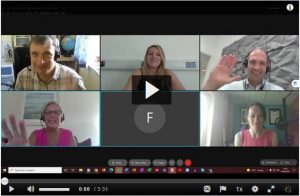
All posts by Alison
Analysing Perceptions of Online Games-based Learning: Case Study of the University of Northampton

The Session: Student Feedback on the Content
Initial Feedback on the Content:
What went well:

Things to work on:

The Session: Student Feedback on the Technology
GAMING was first introduced to students in our September 2019 cohorts for Midwifery, Nursing (all branches), Social Work, Occupational Therapy, Physiotherapy
Initial Feedback on the Technology:
What went well:

Things to work on:

The Technology: why Xerte?


Blog Post: Anne Misselbrook
Xerte e-learning ‘GAMING: Gamification for the Advancement of Multiprofessional Interprofessional Groupwork’
Xerte toolkits is a free browser-based software with a suite of tools used to create interactive accessible online e-learning resources. Learners can participate in online activities on their device 24/7 with Wi-Fi/internet access.
Creating the resource
A large variety of page type templates enable the creator to provide a range of interactive e-tivities so that learners can be active in their online learning.
When the creator produces the Xerte e-learning resource, they are able to work collaboratively with peers on the project. The Xerte function called ‘Shared Settings’ enables colleagues to co-edit the Xerte in the Editor. This feature is of huge benefit to staff.
With the availability of Wi-Fi/internet access 24/7, Xerte Toolkits software is available 24/7 to create content, meaning the creator has the choice of where and when they work on their Xerte project, with the confidence of knowing that the result will be a professional look and feel e-learning resource.
Why is this Project unique?
What makes Alison Power’s Xerte unique is that GAMING was built with student collaboration in mind.
Students can access the Xerte simultaneously whilst in the synchronous session, and work through the interactive tasks such as viewing pre-recorded video clips of individuals taking part in a game-based activity called ‘Lost at Sea’, followed by trigger questions, and group/individual reflections. Students are then provided with videos presented by expert contributors, followed by a drag and drop task to reinforce and seal learning. Following the drag and drop task, the learners work collaboratively on a shared PowerPoint slide embedded in to a Xerte page, where they will edit the slides with their thoughts and opinions.
To confirm their learning, the final separate quiz task asks the learners to answer two questions in Mentimeter where the word cloud can provide instant evidence of learning.
This Xerte called ‘GAMING Gamification for the Advancement of Multiprofessional Interprofessional Groupwork’ is a nicely packaged ‘all in one’ resource with a logical linear sequence flow offering plenty of participation with online e-tivities.
After the synchronous live ‘real-time’ session, the Xerte e-learning resource is available to learners on the Virtual Learning Environment (VLE) as a revision resource to play again and again.
A well planned Xerte resource which encompasses good instructional design, ensuring that the Xerte is intuitive to use.
Link to Anne’s Blog:
GAMING: Gamification for the Advancement of Multiprofessional/Interprofessional Groupwork
Professional Context
Professional Bodies regulating health and social care programmes in the Faculty of Health Education and Society require Interprofessional Education (IPE) to be embedded in pre-registration education.

The NMC ‘will only approve programmes where the learning culture is ethical, open and honest, is conducive to safe and effective learning that respects the principles of equality and diversity, and where innovation, interprofessional learning and team working are embedded’ (NMC, 2018:5).

The HCPC state that programmes of study ‘must ensure that learners are able to learn with, and from, professionals and learners in other relevant professions’ (HCPC, 2017:35).

SWE state Education and Training Providers should ‘ensure that students are given the opportunity to work with, and learn from, other professions in order to support multidisciplinary working’ (SWE, 2021:11).
Rationale
Interprofessional collaboration and teamworking is integral to professional services’ processes and procedures; embedding interprofessional education (IPE) into the Faculty’s ‘collaborative curriculum’ is fundamental in ensuring students are adequately prepared to join their respective professions. Perceptions of IPE as an additional learning-burden are problematic and as such a new, innovative approach to learning, promoting student engagement, motivation and instilling the importance of IPE, is required.
GAMING will support cross-Faculty learning and collaboration via IPE students using gamification technology to work in interprofessional groups to jointly consider a series of challenges/conundrums. The Project aims to establish that by GAMING, senior students will not only demonstrate learning with, from and about each other, but will also enhance their skills of collaboration, negotiation, conflict resolution and leadership.
This project will enable the delivery of a high-quality learning experience by developing, implementing and evaluating GAMING: an innovative games-based learning and teaching resource which up to 300 final year students will engage with in interprofessional groups during a synchronous online session.
GAMING will support students with developing transferable ‘soft’ skills and provide them with a flexible resource for working collaboratively. Working on this project will encourage and enhance interprofessional and cross-Faculty communications, and teamworking which will prepare them for the realities of interprofessional practice.
Meet the Team
Project Lead: Alison Power

RM, SFHEA, MProfPrac, MSc, PGCTHE, PGCPE
Associate Professor (Learning and Teaching)
Faculty lead for Interprofessional Education
Academic Integrity Officer
E-learning/Multimedia Resources Developer: Anne Misselbrook

‘The Cast’: Mark Allenby, Devon Rossetti, Robin Sturman-Coombs, Rachel Love

Devon Rossetti (Lecturer in Education)
Robin Sturman-Coombs (Senior Lecturer in Social Welfare)
Rachel Love (Senior Lecturer in Physiotherapy)
Introduction to GAMING (Gamification for the Advancement of Multiprofessional / INterprofessional Groupwork)
Welcome to our Learning Enhancement and Innovation Project Blog!
GAMING received funding from the University of Northampton‘s
Learning Enhancement and Innovation Fund 2021-22.
Here’s a short video to introduce the Project:
[kaltura-widget uiconfid=”43617711″ entryid=”1_ewujht69″ responsive=”true” hoveringControls=”false” width=”100%” height=”56.25%” /]
